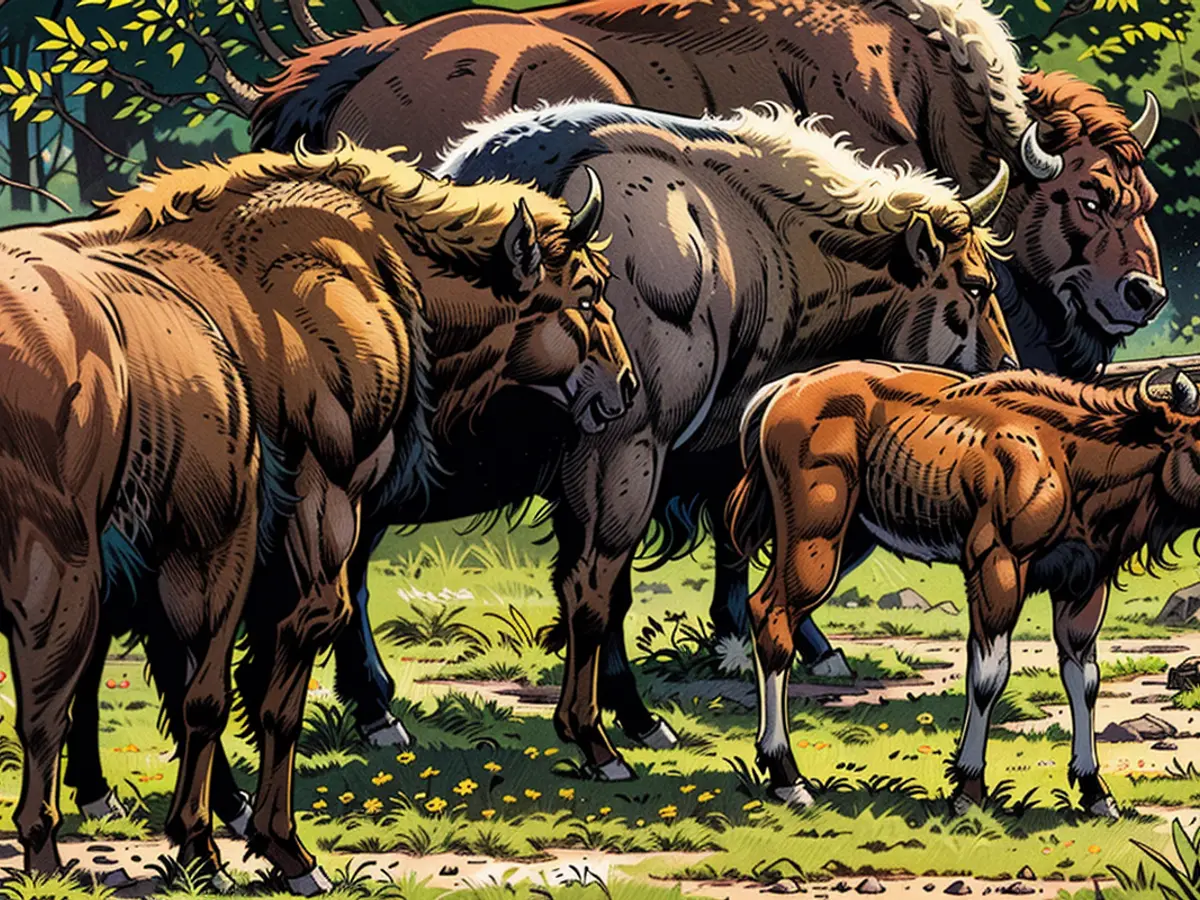Animal welfare - BUND wants bison to be released from the Rothaarsteig fence
In the dispute over Germany's only free-living Wisent herd, which was captured several months ago, the Federal Association for Environment and Nature Protection Germany (BUND) intends to achieve a judicial release of the animals from their enclosure through legal means. "The animals are in a precarious situation. Around 40 Wisents on 24 hectares is too small for a species-appropriate keeping," said Holger Sticht, NRW state chairman of the nature protection association, on Tuesday to dpa inquiry.
The strictly protected animals are being held without legal basis in the enclosure. "The situation will inevitably get worse, there is a risk of diseases and parasite infestations," said Sticht. Almost all cows are pregnant. The calves are expected at the end of August, and the situation will then worsen further. The Wisents no longer have natural feeding opportunities within the enclosure.
Emergency application at the Administrative Court of Arnsberg
The BUND has filed an emergency application with the Administrative Court of Arnsberg for the release of the animals by way of an interim order, as the association announced. A decision may fall as early as July, according to the BUND. Already in April, a main proceeding lawsuit was filed to "end the unlawful detention" of the animals. It is important to prevent deaths - also in view of territorial fights in the small enclosure. The BUND is concerned that the Siegen-Wittgenstein district may create facts and transport the Wisents to other animal parks in Europe, which would be unlawful from the BUND's perspective.
Background and history of the herd
The Wisents were released into the wild as part of an internationally noted wildlife protection project eleven years ago. Initially, there were eight animals, the only free-living herd in Germany. They were released in the Wittgensteiner Land in the Rothaargebirge - based on a contract between a former caretaker association, the Siegen-Wittgenstein district, and the Arnsberg district administration. However, the herd had grown significantly, wandered far beyond the planned project area, and caused significant damage to trees according to forest farmers.
After a long, paralyzing dispute and search for solutions, no perspective for saving the project could be seen by the end of 2023. In March 2024, the Siegen-Wittgenstein district announced that 40 animals were now living "in a newly constructed, approximately 25 hectare large management enclosure on the territory of the city of Bad Berleburg, so that the release phase is currently terminated".
Previously, the former environmental ministers Ursula Heinen Esser (CDU) and Johannes Remmel (Greens) had recommended at a roundtable that the wandering herd be quickly caught and reduced to 20 to 25 animals - that is, several Wisents be transported to herds at other locations in Europe. In addition, the owner of the land, over which the Wisent territory in the Siegen-Wittgenstein district was to be located, according to the district's statements, was no longer willing to make his land available.
- The BUND is advocating for the judicial release of the Wisent herd, which is currently in an enclosure in Bad Berleburg, as they believe the animals are in a precarious situation due to living in confined spaces.
- According to Holger Sticht, the state chairman of the nature protection association in North Rhine-Westphalia, housing 40 Wisents on just 24 hectares is not suitable for species-appropriate keeping.
- The animals are being held in the enclosure without a legal basis, and the BUND has filed an emergency application with the Administrative Court of Arnsberg to release the animals by way of an interim order.
- The release is crucial to prevent further deterioration of the animals' health, as the closely confined space increases the risk of diseases and parasite infestations.
- The BUND is also concerned that the Siegen-Wittgenstein district may transport some of the Wisents to other animal parks in Europe, which would be unlawful from the BUND's perspective.
- The dispute over the Wisent herd dates back to 2013, when the animals were released into the wild as part of a conservation project in the Rothaargebirge, North Rhine-Westphalia.
- However, as the herd grew and caused significant damage to trees, a long and unresolvable dispute ensued between various parties, including the Siegen-Wittgenstein district and the Arnsberg district administration.
- In March 2024, the Siegen-Wittgenstein district announced that it had transported the 40 animals to a newly constructed management enclosure in Bad Berleburg, effectively terminating the release phase.







